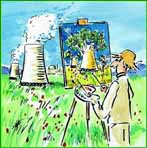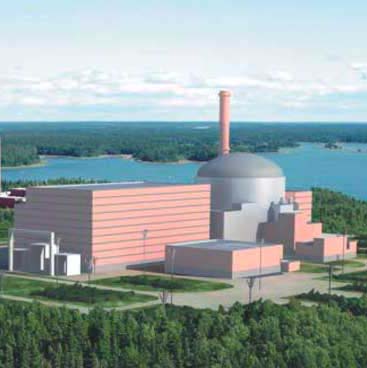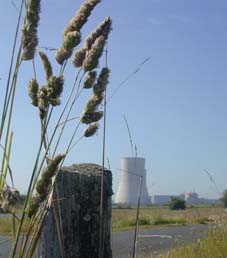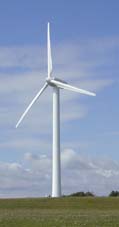|

|
EFN -
NEWS
Newsletter of
EFN
Environmentalists
For Nuclear Energy
21st
October 2004
|
This document is archived on
the internet and can be consulted at the following address:
http://www.ecolo.org/archives/archives-nuc-en/
The First French EPR will be
built in Flamanville (Normandy)
 EPR project in Finland (rights reserved)
EPR project in Finland (rights reserved)
Apologizing : the EPR being a
French reactor, the literature available about it (including some of
EFN's documents) is mainly in French. Some of the links proposed
below may therefore be in French. To translate these documents to
English, if necessary, you can use the free Google-automatic
translation service at http://www.google.fr/language_tools?hl=en
Dear friends of clean nuclear energy,
EDF has confirmed the site where will be built the
first French EPR (EUROPEAN PRESSURIZED REACTOR). It will be
Flamanville, in Normandy, where two pressurized water reactors of
1330 MW each are already in operation..
The sites of Tricastin (on the Rhône river)
and Penly (in Seine-maritime, on the seaside) were also candidates to
host this new EPR. It was however preferable to install the reactor
on the seaside (which eliminated Tricastin), and as concerns the site
of Penly, Laurent Fabius, a local political leader, former Prime
Minister and member of French Parliament, had campaigned against the
EPR together with the Greens, which probably played against
Penly.
The President of EDF (ELECTRICITE DE FRANCE, the
world's largest electrical utility, which owns and operates all of
France's 58 nuclear reactors), Pierre Gadonneix, has confirmed the
choice of Flamanville on thursday 21st october 2004, after
a board meeting of EDF.
This decision had been delayed since many years
and was becoming urgent. See about this subject the schedule
for the EPR.
In 2005 and 2006, administrative procedures will
take place, before the construction starts in 2007.
The reactor should be in operation by
2012.
The 58 existing French nuclear reactors, are to be
replaced starting in 2020 This lead-unit EPR reactor is meant to
validate the new EPR concept and design, before building a series of
EPR's to replace the 58 existing reactors. The EPR is not a
revolutionary reactor, but an optimized version of the pressurized
water reactors in operation today, who already work very well and are
quite clean and very safe.
The French National Safety Authority
(Autorité de Sûreté Nucléaire - ASN) had
authorized the EPR project to proceed on October 5th, indicating that
this reactor includes significant improvements compared to existing
reactors. The EPR has better safety systems, is more competitive,
reduces the amount of waste produced and lowers the exposition of
nuclear workers to radioactivity.
Constructing the EPR will take 5 years. But
beforehand, there are 2 years of administrative procedures, and to
test it properly before constructing a series, the EPR needs to
operate at least until the first refuelling period, which requires
another 18 months to 2 years. Adding up these time spans, one
realizes that 2004 is the deadline if we want to have EPR's
constructed by series, tested properly, and the following units
on-line in 2020, This decision was therefore quite urgent and needed
to be taken nowadays.
Humanity continues to reject into the atmosphere
800 tonnes per seconde of CO2 which contributes to the greenhouse
effect. Each EPR such as the one to be built in Flamanville will
spare 4 million tons of CO2 from being rejected into the atmosphere
every year.
Constructing this EPR in Normandy is good news for
the local environment in Normandy, good news also for the country and
for the planet. This will help preserve France and Europe from being
too greatly dependent of imported oil. While warfare continues in
Irak, Saoudi Arabia is more unstable than ever, and English natural
gas production, which used to help Europe not to be totally dependent
on the Persian Gulf, is now starting to decline this year.
The EPR is a EUROPEAN project, putting together
the best European technologies. Born from the very start of a
Franco-German cooperation (between Framatome and Siemens, now united
in Areva), the first EPR was bought in 2003 by Finland, a country
with a high reputation of ecological consciousness, and is planned to
be operating in 2010. The new EPR in Flamanville will be owned and
operated by a european consortium comprising, in addition to EDF,
several other partners. Belgium, Spain and Italy, among others, seem
to be interested and are considering a participation in the
consortium.
The financial investment (cost of building the
reactor) will be about 3 billion euros. This may seem to be a large
amount, but the reactor will produce huge quantities of high-value
clean killowatts on-demand : 1600 megawatts, thereby amortizing the
investment in a reasonably short time span. Chine, for example, has
bought two 900 MW nuclear reactors built by Framatome at
Daya
Bay (which started operating in 1993 and
1994), the construction cost of which was covered by the sales of the
electricity produced in far less than ten years of baseload
production, and these reactors will now probably continue producing
until they are about 50 years old, if not more.
While the price of fossile energies (oil, natural
gas, coal) continues to soar, the EPR is becoming highly competitive.
It is not only a reliable source of cheap electricity, much cheaper
than fossile fuels, it also makes France more independent of oil and
of the emirs of Arab States which are more unstable than ever. The
Persian Gulf concentrates two thirds of the remaining cheap oil
reserves in the world.
The French EPR is not subsidized by the French
authorities or other hidden subsidies (contrary to renewable
energies, which should also be developed, but produce only minute
quantities of energy, in an inconstant manner, and cannot be
developed without strong and continued financial backing). The region
and Département de Basse Normandie, to attract the EPR reactor
on their territory in the competition between the three sites, have
agreed a local professional tax exemption for the new EPR reactor of
100% the first year, 80% the second, 60% the third, 40% the fourth
and 20% the fifth year. This fiscal gift will amount to 70 million
euros in five years. This is only a marginal advantage for EDF
compared to the investment cost, but nevertheless demonstrates the
motivation of the region, of the Département de
Basse-Normandie and illustrates the support of local politicians to
the project.
Developing all clean energies, including nuclear
energy, is necessary, useful, and more urgent today than ever before.
Nuclear energy is the only energy available capable of replacing in
two or three decades a significant proportion of today's fossile
energies. However, even a massive developement of nuclear capacity in
the world will not suffice to face the planet's energy needs when oil
will run short.
EFN demands that in addition to a strong come-back
and development of nuclear energy around the world, strong support be
also given to energy conservation, geothermal energy (heat pumps),
solar thermal energy (hot water), and to the development of clean
vehicles.
Some dreamers and anti-nuclear organizations
pretend that building more windmills would be a better solution for
France than an EPR. Click
here to discover how many of the most
modern windmills (twice as high as the cathedral of Paris) are needed
to replace an EPR such as the one that will be constructed in
Flamanville.
The United States, China, India, Japan, Korea,
Russia, and Finland (among others), are running nuclear today or
planning to go nuclear again, in part because of nuclear energy's
environmental advantages.
EFN totally approves the wise decision taken by
the French Government and EDF to build the EPR.
EFN has in fact strongly contributed to the
preparation of this positive decision to build the EPR since several
years, by informing the public about the benefits of clean nuclear
energy and the necessity of an EPR, by our interviews and articles in
the news media, through our mailing list in French language, our web
site in French (www.ecolo.org and click on the French flag, or just
click
here), our participation in public
debates, our lectures given throughout France (several hundred
lectures given all around the country since EFN was created). Our
goal is now to develop and duplicate EFN's actions in as many other
countries as possible. If you are willing to help us in this regard,
please contact
EFN.
About the EPR, see for example the script of my
radio
interview on RMC (one of the biggest radio stations in France)
discussing the merits of the EPR with Corinne Lepage in november
2003 (Corinne Lepage is a notorious
anti-nuclear lawyer and political personality in France).
EFN was also the NGO who contributed the most in
the "National
debate on energies" which was held during
the first semester of 2003 in France, paving the road for the
National Energy Law in 2004, defining the major energy orientations
for France in the next 30 years. In total, about 40 different events,
expositions and lectures were orgainzed by EFN to inform the public
in thie context of this National Debate.
It is essential to produce electricity cleanly,
and to free our world from its addiction of burning oil and fossile
resources, whilst oil
reserves are already significantly
depleted. To avoid a major crash of our
modern societies when oil wells around the world start running dry,
humanity should rapidly undertake what France has done in 1973 : at
least produce its baseload electricity with clean nuclear energy. In
the meanwhile, France and existing nuclear countries will need to
replace the existing reactors when they arrive at the end of their
service lives. The next step, beyond electricity generation, is to
get rid of oil for transportation. We are lucky enough to have
several solutions at hand : hydrogen/fuel cells (the hydrogen being
produced by nuclear reactors) and in the very short term, developing
electric vehicles (well adapted to short distances such as commuting)
or hybrid vehicles such as the Toytota Prius (for longer distances).
The storage capacity of the batteries of electric
vehicles have much improved in the recent
years and their range is now above 200 km (more than enough for most
commuters and small local use such as driving the kids to
school).
For more information on nuclear energy, on the
EPR, or its competitors such as the AP1000 or AP600, you may refer to
our "documents"
section (in English) on the web site.
There, you will find hundreds of documents, including some exclusive
ones, in a dozen languages, about energy and the environment. You
will also learn about other new types of reactors, renawable
energies, natural radioactivity, energy concservation, the rapid
depletion of oil reserves, and much, much more, all this for FREE
(just visit the web site) !
Don't forget to subscribe
or renew your membership (to subscribe or
renew your membership at EFN-USA,
click here) before the next Annual
Assembly of EFN, expected to be held late in November or in December
on a saturday afternoon in Houilles (near Paris). Both Annual
Assemblies (that of EFN-international and of EFN-USA) will be held on
the same day, same place. The date of this next Annual Assembly will
be confirmed in a next message ASAP.
Sincerely and ecologically yours,
Bruno Comby
President of EFN
____________
Some recommended documents :
The
end of oil is approaching, are we ready ?
(source : EFN, 2003)
How
many windmills would be necessary to replace just one EPR
? (source : EFN, 2004)
Schedule
of the EPR (source : EFN, 2004)
Presentation
of the EPR (source : Areva,
2003)
EPR
in Finland (source : Areva,
2004)
Bruno
Comby, EFN founder and
president (http://www.ecolo.org
), is a well known Euorpean environmentalist, the author of 10 books
published in 15 languages on healthy living, ecology and energy,
including the bestseller "Environmentalists
For Nuclear
Energy".


http://www.ecolo.org
EFN - For complete and
straightforward information on energy and the
environment
To subscribe (or unsubscribe) to EFN's mailing list, go to EFN's
web site : http://www.ecolo.org
and click on "mailing list".
You may, with their approval, freely subscribe to the mailing list
all those among your friends who would like to be informed about
energy, the environment, and EFN's activities. To do this, just type
their e-mail address above, and click the "Subscribe" button (with
their approval).
To subscribe to our mailing list, the only condition is to share
our point of view and to type in your e-mail in the box above. You
will then be informed automatically of EFN's activities. This
subscription is entirely GRATIS. EFN is a not-for-profit
organization. It does not place any commercial advertisements on it's
web site, and does not sell it's mailing lists to anybody. To help
the EFN continue its activities, inform the public, and maintain this
FREE service, you can subscribe
or make
a donation to the association. Your donations are tax-deductible
in France. For subscriptions and donations intended for EFN-USA,
click
here (for our American readers and US citizens, donations in US$,
EFN-USA is a 501(c)(3) tax-exempt not-for-profit corporation). For
donations in Japanese Yens (for our Japanese readers), click
here.
©
EFN, all rights reserved - Unless
specifically mentioned otherwise, reproduction, use or distribution
of these information, texts or images, without EFN's prior written
approval, is forbidden

 EPR project in Finland (rights reserved)
EPR project in Finland (rights reserved)

